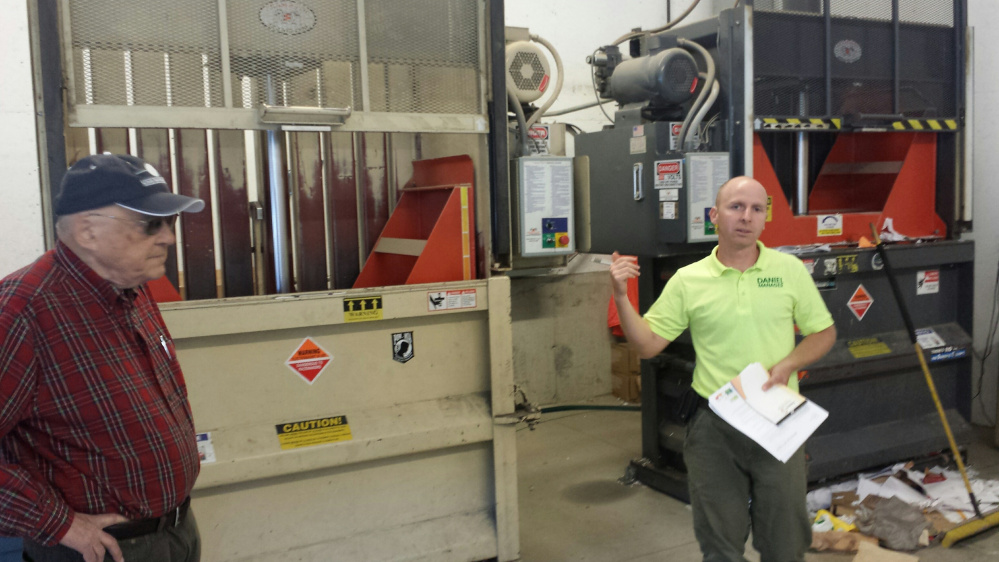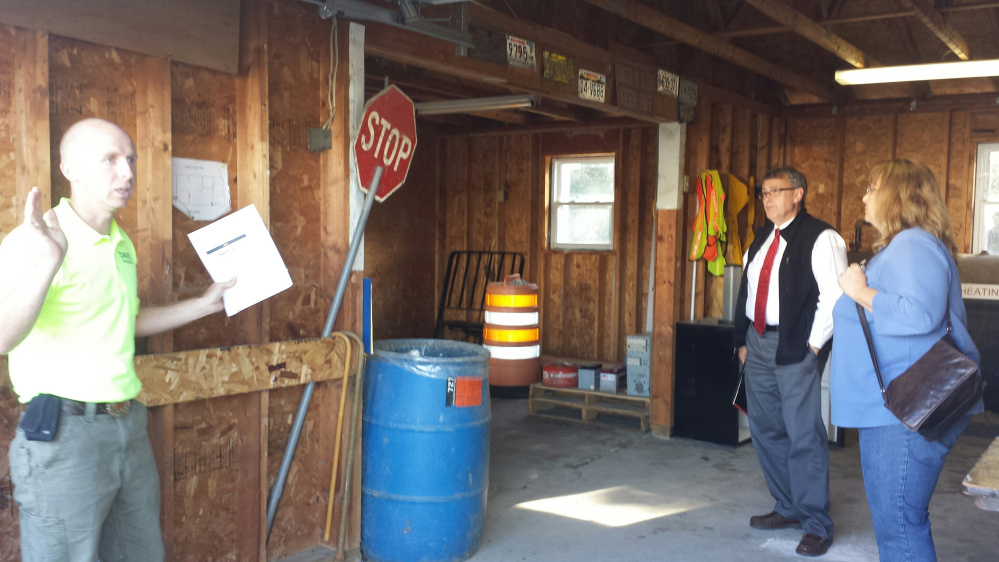OAKLAND — As the Transfer Station committee stood in front of the tipping pad at the end of a tour of the station, a man backed his pickup truck in.
He unloaded a few blue garbage cans onto the ground and some flattened cardboard boxes, and drove away.
Town Manager Gary Bowman looked at the cardboard and shook his head.
“All this stuff could generate a revenue to the taxpayers,” he said. “And instead we’re gonna pay to have it hauled off.”
This is the problem the committee faces as it moves to its next goal: more recycling.
The station, which is on Town Farm Road, collects not only municipal solid waste, but also recyclables like glass, cardboard, paper and compostable food waste.
However, the town’s recycling rate — calculated from municipal solid waste, or the average household waste — was 15.49 percent in 2015. The state’s goal, stated in a statute, was to recycle or compost 50 percent of the total municipal solid waste tonnage within the state by Jan. 1, 2014.
Bowman recently visited Skowhegan’s Transfer Station, which has a 23.44 percent recycling rate.
The difference between the two stations, Bowman said, is convenience. In Skowhegan, people can easily drop off their recycling when they drive around the circle.
Cynthia Kirk, administrative assistant to solid waste Supervisor Randall Gray, said the station in Skowhegan used to have a two-way traffic flow. It was changed to one-way to make it “more efficient and easier” for residents, and she does think it’s increased recycling over time. The station didn’t incur any debt to make the change, she said.
However, the difference does have a price. Oakland’s transfer station, which serves a town of about 6,200, has an average budget of $450,000 to $460,000, according to Bowman, and only three full-time employees. Skowhegan’s station, which serves a population of a little under 8,600, has a budget that ranges from $805,000 to $820,000, generally, and five full-time employees.
“We are different from Skowhegan, there’s no question,” Daniel Hapgood, the manager of Oakland’s Transfer Station and a member of the committee, said.
He added that it’s not feasible to try to model Oakland’s station after Skowhegan’s. “We do a lot they don’t do. We maintain a clean facility with a lot less help and a smaller budget.”
The Oakland committee, which is committed to keeping costs low, circles around options that seem promising, but would probably come with a substantial price tag.
Hapgood said he would start by utilizing some of the spaces at the site currently being used just for storage.
For example, a garage space that used to be the recycling site could instead be used to fill “holes in our services,” he said. The station could potentially take things like electronics and paint on a regular basis. Now, those items sometimes pop up in the municipal solid waste.
But that doesn’t solve one of the station’s most pressing problems, which is that some residents haven’t ever been in the recycling station, Hapgood said. The recycling station is in a nearby building adjacent to the tipping pad.
Right now, people don’t have to drive past recycling to get to the place to dump their trash, like they do in towns like Skowhegan and China, and moving recycling bins to the entrance or the side of the tipping pad would harm the station’s efficiency. The site has no designated parking and sees about one car per minute on an average Sunday, Hapgood said, so they have to be careful about where they put things to avoid accidents and angry residents.
And, as he said, they can’t move buildings, so the machines to process the recyclables will always be where they are now.
Still, Hapgood has some ideas for how to make recycling easier for residents, including a dual-stream model with standardized bins residents could drop off, then pick up empty ones immediately and be on their way. One employee could sort all day in the recycling station. Dual-stream recycling would separate paper and maintain its quality so the station could still sell it and make money from it. Recyclables’ quality decreases with a single-stream system, Hapgood said.
Ed Roderick, a resident and committee member, said that the townspeople really have to learn to change.
“If you really want to make people recycle, pay-per-bag,” he said. “Hit ’em in the wallet.”
Madeline St. Amour — 861-9239
mstamour@centralmaine.com
Twitter: @madelinestamour
Send questions/comments to the editors.





Success. Please wait for the page to reload. If the page does not reload within 5 seconds, please refresh the page.
Enter your email and password to access comments.
Hi, to comment on stories you must . This profile is in addition to your subscription and website login.
Already have a commenting profile? .
Invalid username/password.
Please check your email to confirm and complete your registration.
Only subscribers are eligible to post comments. Please subscribe or login first for digital access. Here’s why.
Use the form below to reset your password. When you've submitted your account email, we will send an email with a reset code.